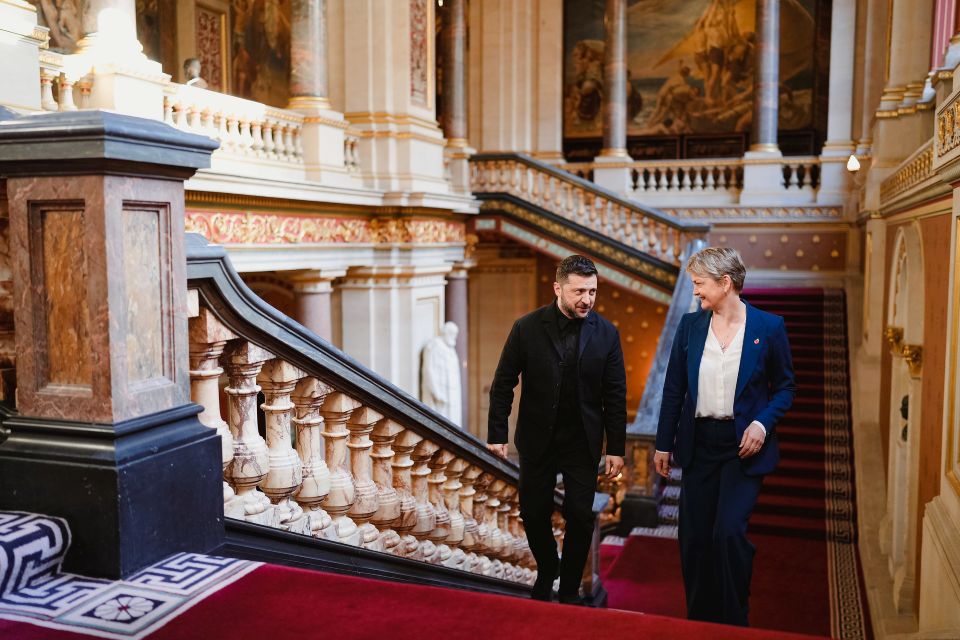For peace in Ukraine we must go after Russia’s money: Foreign Secretary's article
Writing in The Times, the Foreign Secretary outlines why now is the time for fresh economic pressure to deprive the Kremlin of war revenues and push Putin to the negotiating table.

To get a just and lasting peace in Ukraine, we have to go after Russia’s money. Three and a half years on from President Putin’s unprovoked invasion of a sovereign nation, he has failed in his war aims, but he is refusing to pursue peace.
The UK has been driving the case for economic action against Russia with our allies – announcing our own new crackdown on Russia’s 2 biggest oil and gas companies as I did in parliament 11 days ago, swiftly followed by similar major sanctions from the US and new EU sanctions last week and an important meeting of the “coalition of the willing” on Friday. With the tailwind behind us, now is the time for fresh economic pressure to deprive the Kremlin of war revenues and push Putin to the negotiating table.
President Zelensky has made clear he is ready for a ceasefire and for serious peace talks. But Putin has sought only to escalate conflict – launching some of the largest attacks in Europe since the height of the Second World War: children killed in playgrounds, hospitals destroyed, and vital energy infrastructure hit. A cruel and deliberate strategy in the run-up to winter.
But Ukrainian people are standing strong. In Kyiv last month, I saw a nation resolute in its fight. The soldiers and civilians, mothers and fathers and health care workers who are defending their homes and their land.
At every stage the Russian president has been deluded – on the war he thought he could win in three days in 2022, on the strength of Ukrainian resilience and resistance and on the determined support of Ukraine’s friends.
Instead, after a million Russian casualties and a front line essentially where it was three years ago, Putin has failed in all his military and political objectives. The Russian economy is ailing. Forty per cent of federal spending goes on the war. The Kremlin is struggling to equip its forces, resorting to military kit from the 1950s.
The UK and allies – many that gathered for the “coalition of the willing” in London on Friday – are continuing to ensure there is a strong flow of weapons, air defence and infrastructure support to sustain Ukraine in its fight. And as we head into winter, we are helping the Ukrainian people withstand Putin’s onslaught including repairing damaged energy infrastructure to keep Ukrainian homes warm as temperatures drop.
At the UN general assembly last month, I told Sergey Lavrov, the Russian foreign minister, directly that “we will target your ailing economy, your oil and gas revenues and the defence industry making your munitions”. That is exactly what we have done.
In the past six weeks I have agreed and announced two major new packages of sanctions hitting Russia’s oil and gas. Eleven days ago the UK sanctioned Rosneft and Lukoil – the largest 2 Russian energy firms. We also designated refineries around the world that import Russian oil; suppliers of drone and missile components; and a further 42 shadow fleet vessels that transport Russian oil.
Collective efforts will make the greatest difference. So I strongly welcome President Trump’s decision this week to also sanction Rosneft and Lukoil, which is prompting other countries to think again about Russian oil imports. The EU’s 19th sanctions package, imposed this week, is a powerful further show of shared resolve.
Already Western sanctions have deprived Russia of at least $450 billion – equivalent to about 2 more years of funding Putin’s war. But I am clear we need to go much further still in tightening the economic vice. That means new measures to choke Russian oil and gas out of international markets but it also means leveraging Russian assets.
Now is the time for international action to use Russia’s frozen sovereign assets to support Ukraine. Through measures like the reparations loan proposed by the EU Commission and through chancellor Rachel Reeves’s efforts with international partners, we need to ensure funds can be used to support Ukraine’s resistance and reconstruction right now. Because, frankly, it is Russia that should pay for the damage they are doing to Ukraine.
Ukraine’s security is Europe’s security. That is why the UK continues to stand squarely with Ukraine, now and for decades to come. Not just to help brave people to defend themselves. But to make clear that aggression will not pay; that force will be resisted; and to defend principles that matter for the whole world.
This article was first published in The Times.